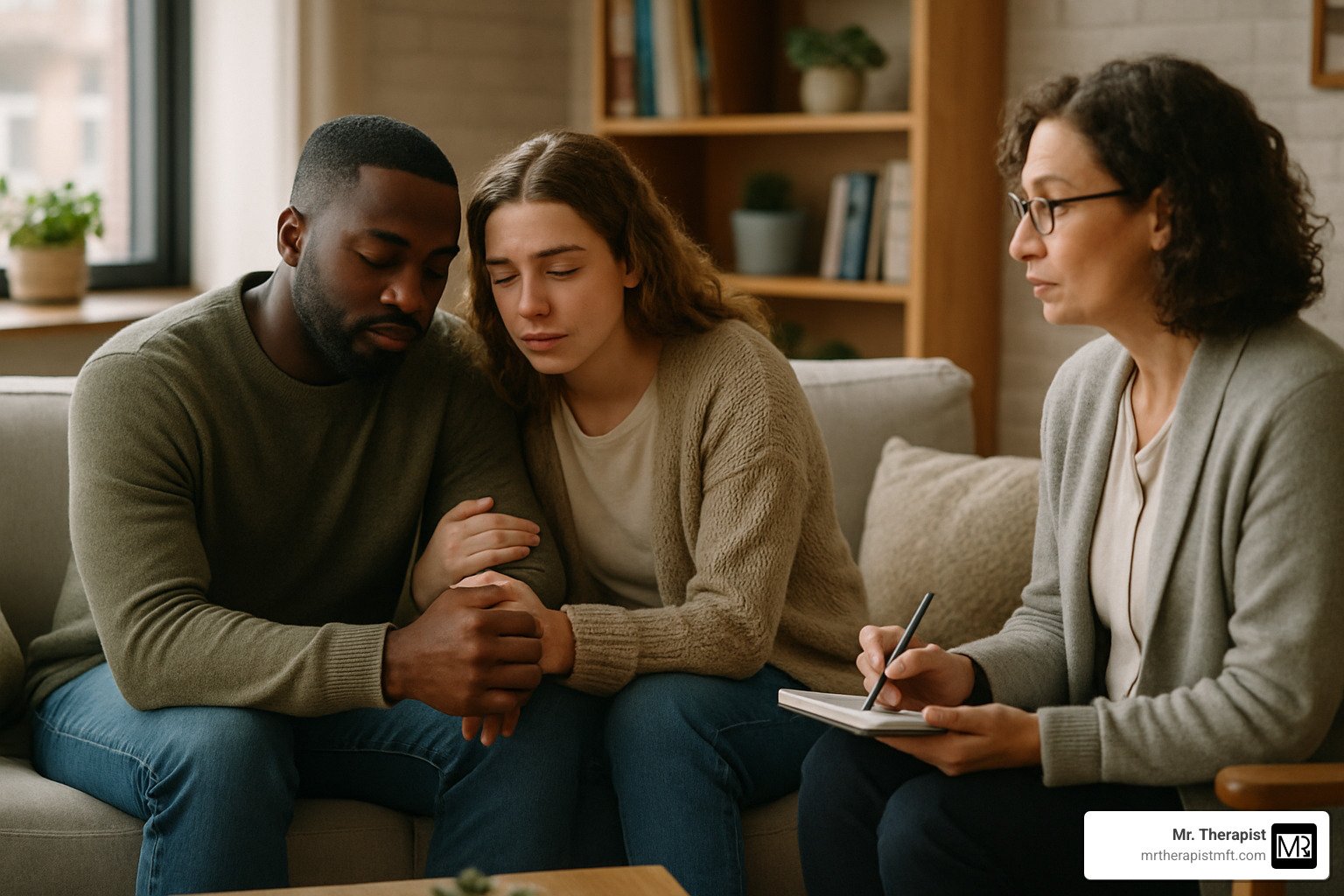
Understanding Marriage Counseling Prices: What to Expect
When you’re considering therapy for your relationship, one of the first questions that probably comes to mind is: “How much is this going to cost us?” It’s a perfectly reasonable concern – after all, you’re already juggling mortgage payments, car loans, and maybe even childcare expenses.
The truth is, marriage counseling price points vary widely depending on several factors. Nationally, couples can expect to pay between $75-$250 per session, with the average hovering around $100 per hour. If you’re in a major metropolitan area like New York City or San Francisco, you’re looking at the higher end of that spectrum – typically $150-$250+ per session. Meanwhile, couples in smaller cities or rural areas might find more affordable options in the $75-$150 range.
Your first session often costs a bit more – sometimes 20-50% higher than regular sessions. This is because therapists use this time for a comprehensive assessment of your relationship dynamics and history. Think of it as the foundation upon which your therapy journey will be built.
Online therapy has become increasingly popular, especially since 2020, and typically offers more budget-friendly rates around $65-$100 per week. This lower marriage counseling price reflects reduced overhead costs for therapists and the convenience of connecting from anywhere.
| Type of Service | Average Price Range |
|---|---|
| In-person sessions | $100-$200 per hour |
| Online therapy | $65-$100 per week |
| Urban areas (NYC, SF) | $150-$250+ per session |
| Rural/smaller cities | $75-$150 per session |
| Initial assessment | Often 20-50% more than regular sessions |
I know these numbers might make you wince, but here’s some perspective: the average divorce in America costs between $15,000 and $20,000 – not to mention the emotional toll it takes. Suddenly, even a full year of weekly therapy sessions (roughly $5,000-$10,000) looks like a bargain by comparison.
Marriage counseling isn’t just another expense – it’s an investment in your shared future. The skills you learn – better communication, deeper emotional connection, effective conflict resolution – become tools you’ll use for decades to come. These are skills that not only strengthen your marriage but often improve your relationships with children, friends, and colleagues too.
I’m Emmanuel Romero, a Licensed Marriage and Family Therapist with over seven years of experience helping couples steer relationship challenges. At my San Clemente practice, I’m committed to providing transparent guidance on marriage counseling price options that fit various budgets, because I believe every couple deserves access to quality relationship support.
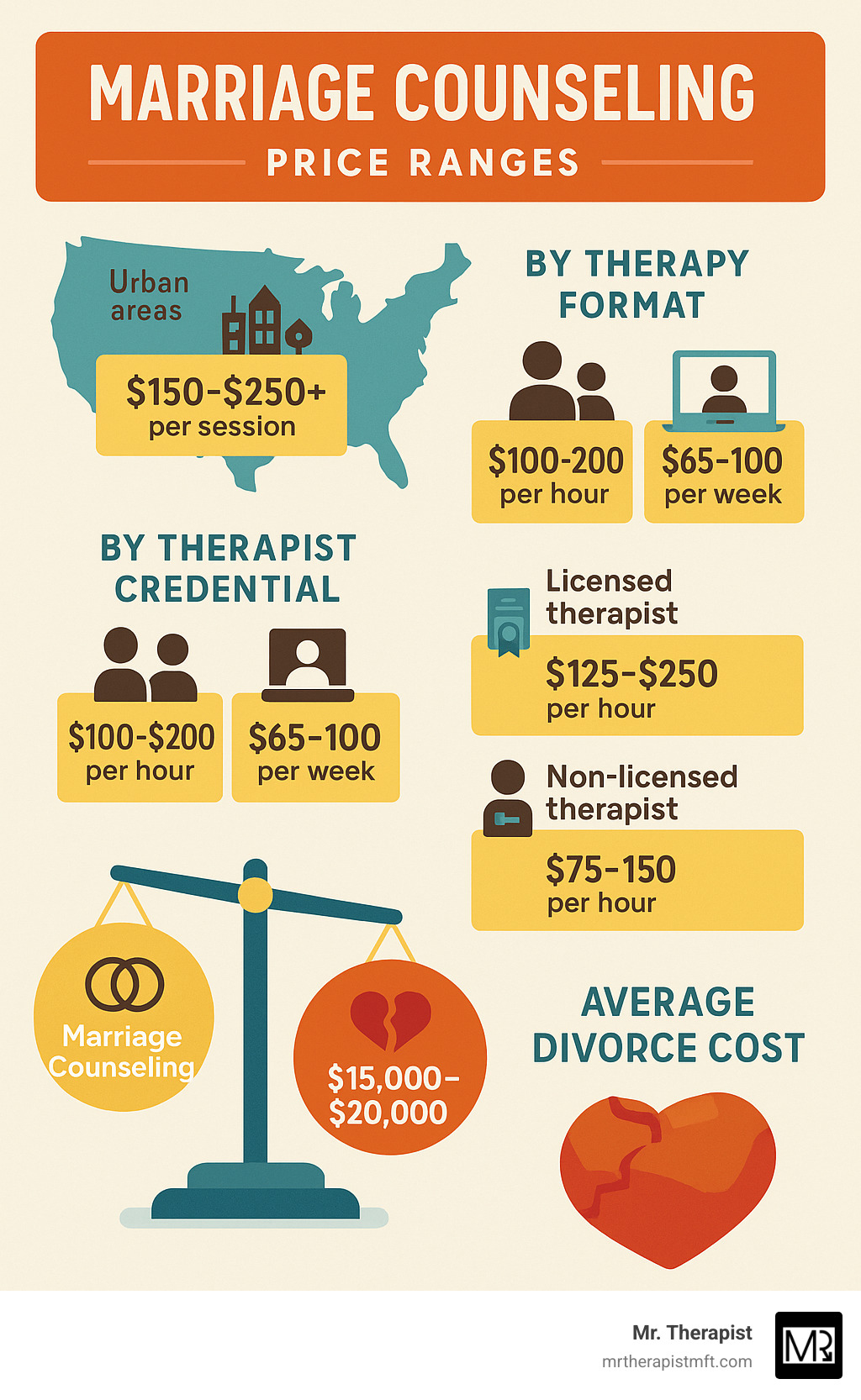
How Much Does Marriage Counseling Cost in 2024?
When couples first contact us at Mr. Therapist, their most pressing question is usually about cost. Let’s be honest—money matters, especially when you’re investing in your relationship. In 2024, the national average for marriage counseling price hovers around $100 per session, though what you’ll actually pay can vary quite a bit.
Most therapists offer sessions between 45-90 minutes, with 50-minute or 75-minute appointments being the most common. That first appointment (what we call the intake session) typically costs a bit more—about 20-50% higher than regular sessions. This makes sense when you think about it—we’re gathering your history, completing paperwork, and laying the groundwork for your therapy journey.
As Dr. Elyssa Helfer, Ph.D., LMFT, puts it: “One of the greatest benefits of marriage counseling is that it allows couples to exist in a unique space where an experienced third party can witness areas for growth and help facilitate movement toward it.”
Here’s what different marriage counseling options typically cost:
| Service Type | Price Range | Session Length | Payment Structure |
|---|---|---|---|
| Traditional In-Person | $75-$250 | 45-90 minutes | Per session |
| Online Video Sessions | $65-$150 | 45-60 minutes | Per session or subscription |
| Premarital Packages | $300-$875 | 5-7 sessions total | Often packaged |
| Intensive Weekend Retreats | $1,500-$5,000 | 2-3 days | One-time fee |
| Group Couples Workshops | $200-$400 | 1-2 days | One-time fee |
Marriage counseling price snapshot by region
Where you live significantly impacts what you’ll pay for couples therapy. Think of it like real estate—location, location, location:
- Northeast: Couples typically pay around $150 per session, with prices in places like NYC and Boston soaring to $125-$300.
- Midwest: More affordable at about $110 per session, ranging from $85-$175.
- South: The most budget-friendly region at $95 on average, with prices between $75-$175.
- West: Expect to pay around $140, though in California and Washington, prices tend to run higher ($100-$250).
Here in San Clemente, California, where Mr. Therapist is based, couples usually pay between $125-$200 per session. The ocean views and California sunshine come with a cost of living that affects therapy prices too!
Marriage counseling price: online platforms vs. local offices
The digital revolution has been a game-changer for therapy accessibility and affordability. Online marriage counseling typically ranges from $65 to $100 per week, often through subscription models rather than per-session pricing.

Why the price difference? Online therapy benefits from several cost-saving factors. Therapists don’t need physical office space (goodbye, rent payments!), can work with clients across wider geographic areas, and often offer subscription packages that provide better value. Plus, neither you nor your therapist wastes time or money commuting.
At Mr. Therapist, we accept flexibility by offering both in-person sessions at our San Clemente office and secure video sessions. Our online sessions typically cost about 15% less than face-to-face appointments, reflecting our lower overhead costs.
And don’t worry about effectiveness—research from the American Psychological Association confirms that online couples therapy can be just as beneficial as traditional in-person sessions for many relationship issues. You’re not sacrificing quality for convenience or cost savings.
7 Key Factors That Influence Marriage Counseling Price
When couples start looking for a therapist, they’re often surprised by the wide range of prices they encounter. Understanding what drives these costs can help you make better decisions about your care without unnecessary sticker shock. Let’s look at the seven biggest factors that affect what you’ll pay for marriage counseling.
1. Therapist Credentials and Education
Those letters after your therapist’s name aren’t just for show—they represent years of education and training that directly impact marriage counseling price:
“Different credentials reflect different training paths, but all licensed professionals have completed thousands of supervised clinical hours,” I often explain to couples calling our practice for the first time.
A Licensed Marriage and Family Therapist (LMFT) like myself has specialized training in relationship dynamics and typically charges between $100-$175 per session. Licensed Clinical Social Workers (LCSWs) often charge slightly less ($75-$150), while psychologists with doctoral degrees (Ph.D. or Psy.D.) generally command higher rates of $150-$250. Psychiatrists, as medical doctors who can prescribe medication, usually charge the most at $200-$350 per session.
At Mr. Therapist, we’re particularly proud of our specialized training in Emotion-Focused Therapy (EFT), which has shown impressive 70-75% success rates for couples in distress.
2. Years of Experience
Just like in other professions, experience matters—and it shows up in the pricing:
Newer therapists with 1-3 years of practice typically charge between $75-$120 per session. As therapists gain more experience and refine their skills (4-10 years), their rates generally increase to $125-$175. Veterans with over a decade of experience usually charge $175-$250 or more, reflecting their depth of knowledge and refined skills.
This doesn’t mean newer therapists provide lower quality care—they often bring fresh perspectives and passionate energy to their work. But those of us who’ve been in the field longer have typically seen more relationship patterns and developed more tools to address them.
3. Therapeutic Approach
Not all couples therapy is created equal. Evidence-based approaches that require additional certification often come with higher price tags:
Emotionally Focused Therapy (EFT), our specialty at Mr. Therapist, has one of the strongest research backgrounds in the field. The Gottman Method requires extensive certification that many therapists invest in over several years. Other approaches like Cognitive Behavioral Therapy (CBT) and Imago Relationship Therapy also require specialized training.
These investments in specific methodologies ultimately benefit you as the client, though they may be reflected in slightly higher session fees.
4. Session Length and Format
While the standard therapy “hour” is actually 45-50 minutes, many couples find longer sessions more productive:
“For couples work, I often recommend 75-minute sessions,” I tell new clients. “It gives us enough time to hear from both partners and still make meaningful progress.”
Longer 75-90 minute sessions typically cost about 1.5 times the standard rate, while intensive sessions running 2-3 hours might come with a slight discount from the straight hourly rate. Weekend intensives, which compress months of weekly therapy into a concentrated format, can range from $1,500-$5,000 for 12-20 hours of focused work.
5. Geographic Location
Your zip code significantly impacts your marriage counseling price. As we noted in our regional breakdown, couples in major metropolitan areas like New York City, San Francisco, or Los Angeles typically pay $150-$300 per session, while those in mid-sized cities might pay $100-$175. Rural areas generally have the most affordable rates at $75-$125 per session.
This geographic variation reflects differences in cost of living, office rental prices, and local market rates. Here in San Clemente, California, our rates at Mr. Therapist reflect our coastal Southern California location.
6. Practice Setting
Where your therapist works can significantly impact what you’ll pay:
Private practices like ours typically have the highest rates ($125-$250) because we cover all our own overhead costs. Group practices can sometimes offer slightly lower rates ($100-$175) by sharing expenses. Community mental health centers often provide sliding scale options ($50-$125), while university training clinics supervised by licensed professionals offer the most affordable options ($25-$75).
Each setting has its benefits and potential drawbacks in terms of consistency, therapist choice, and appointment flexibility.
7. Specialized Services
Some relationship challenges require additional specialized training, which may be reflected in premium rates:
Therapists with expertise in sex therapy often charge 10-25% more than standard rates. Similarly, trauma-informed therapy, addiction recovery support, and multicultural relationship expertise represent valuable specialized knowledge that may command higher fees.
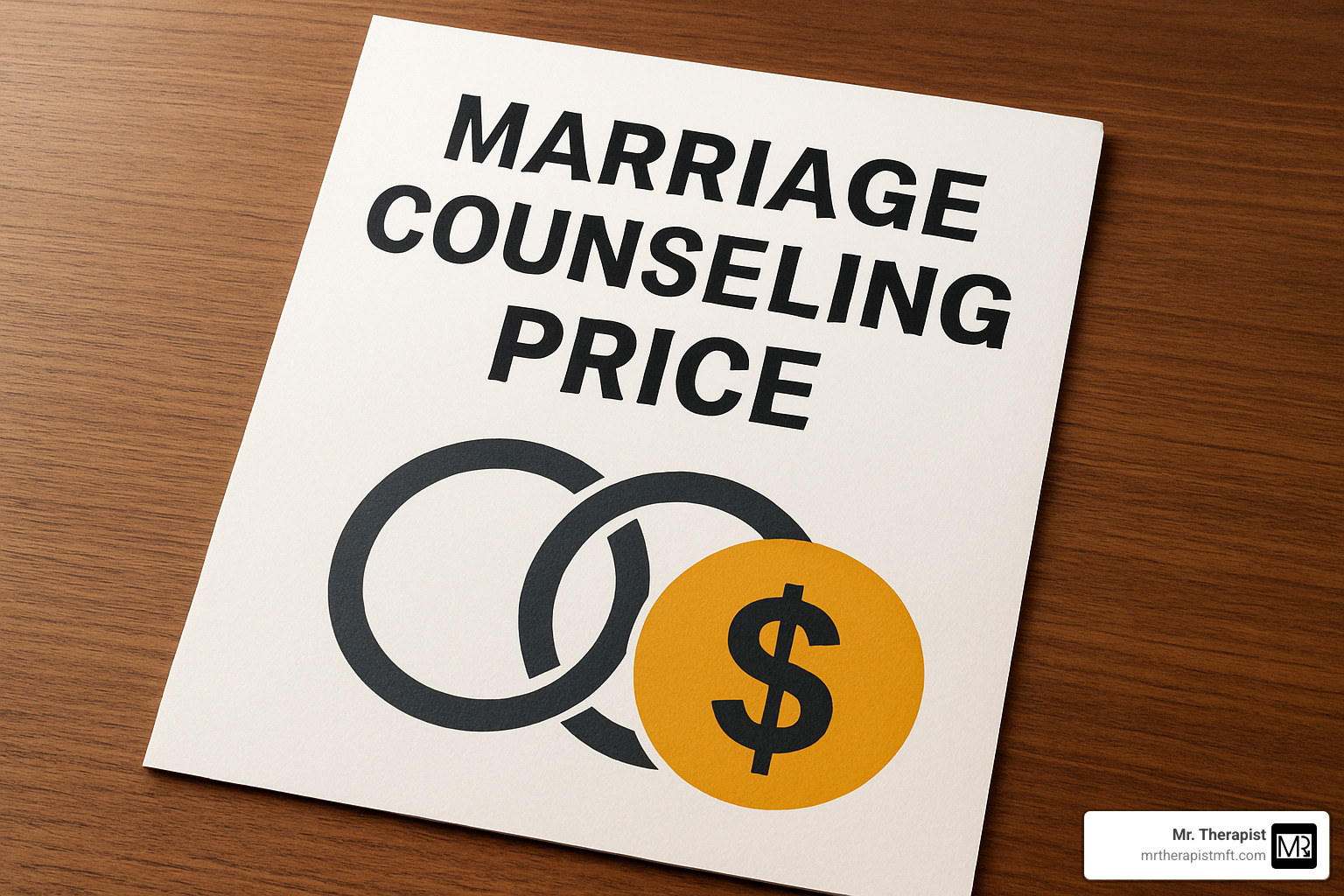
Does insurance ever pay?
This is probably the question I hear most often from couples, and the answer isn’t always straightforward.
Most insurance companies don’t cover marriage counseling as a standalone service because relationship problems aren’t classified as mental health diagnoses. However, there are several ways couples can potentially use their benefits:
If one partner has a diagnosable condition like depression or anxiety that affects the relationship, insurance may cover therapy as treatment for that condition. The Federal Parity Law requires that mental health services can’t have higher copays or deductibles than other medical services, which can make covered therapy more affordable when applicable.
Many therapists, including our practice, provide a “superbill” that you can submit to your insurance for partial reimbursement through out-of-network benefits. When insurance does cover therapy, copays typically range from $30-$50 per session after meeting your deductible.
One bright spot: Health Savings Accounts (HSAs) and Flexible Spending Accounts (FSAs) can typically be used to pay for marriage counseling, regardless of insurance coverage. This at least allows you to use pre-tax dollars for your sessions.
Marriage counseling price packages & bulk discounts
“Think of therapy like a gym membership,” I sometimes tell hesitant couples. “You’ll see better results with consistent attendance than sporadic drop-ins.”
To encourage this consistency, many therapists (including us at Mr. Therapist) offer package deals for couples who commit to multiple sessions upfront. Five-session packages often come with a 5-10% discount from the per-session rate, while 10-session packages might offer 10-15% savings.
Intensive weekend retreats provide concentrated work at a slightly discounted hourly rate. And for couples who have completed an initial course of therapy, maintenance or “tune-up” sessions are sometimes offered at reduced rates.
As my colleague Tony Kesner, LIMFT notes, “Marriage counseling is a collaborative process where we celebrate each partner’s unique strengths and harness them to build a harmonious union.” This process works best when couples can commit to a consistent schedule without financial stress becoming yet another burden on their relationship.
For more information about the research behind couples therapy effectiveness, check out this scientific study on couples therapy efficacy.
9 Ways to Lower Your Marriage Counseling Price Without Sacrificing Quality
Let’s face it – when you’re already stressed about relationship issues, worrying about how to afford help shouldn’t add to your burden. The good news? There are plenty of ways to make marriage counseling price more manageable without cutting corners on quality.
1. Sliding-Scale Fees
Did you know that about 68% of Marriage and Family Therapists offer income-based pricing? It’s true! At Mr. Therapist, we reserve several spots in our schedule specifically for sliding-scale clients because we believe relationship support should be accessible to everyone.
When reaching out about sliding-scale options, be direct and ask, “Do you offer income-based rates?” Be prepared to provide some financial information, and understand that these coveted spots may have limited availability – but they’re absolutely worth asking about.
2. Community Mental Health Centers
Your community likely has publicly funded mental health centers offering relationship counseling at a fraction of private practice rates. While you might wait a bit longer for an appointment, many centers employ highly experienced therapists who choose community work out of dedication to accessible care. Sessions typically range from $20-$75, making them significantly more budget-friendly.
3. University Training Programs
Universities with graduate counseling programs often run clinics where supervised students provide therapy. Don’t let the “student” part fool you – these therapists-in-training are closely supervised by experienced faculty, often resulting in thoughtful, research-informed care. With rates typically between $25-$75 per session, university clinics offer exceptional value while helping train the next generation of therapists.
4. Nonprofit Organizations
Several organizations have made affordable mental health care their mission. Open Path Collective connects clients with therapists offering sessions between $30-$80, while NAMI provides valuable resources and referrals. These nonprofits understand that financial constraints shouldn’t prevent couples from getting the help they need.
5. Religious Organizations
Many faith communities offer counseling services that are open to everyone, regardless of religious affiliation. Church-based counseling centers typically charge $50-$100 per session, and some offer pastoral counseling at minimal or no cost. These services often integrate spiritual perspectives with sound psychological principles, providing holistic support for couples.
6. Group Workshops
If you’re comfortable learning alongside other couples, workshops can be an incredible value. A Hold Me Tight® weekend workshop based on Emotionally Focused Therapy might cost $200-$400 total – significantly less per hour than private sessions. These group experiences not only save money but can also reduce the feeling of isolation as you realize other couples face similar challenges.
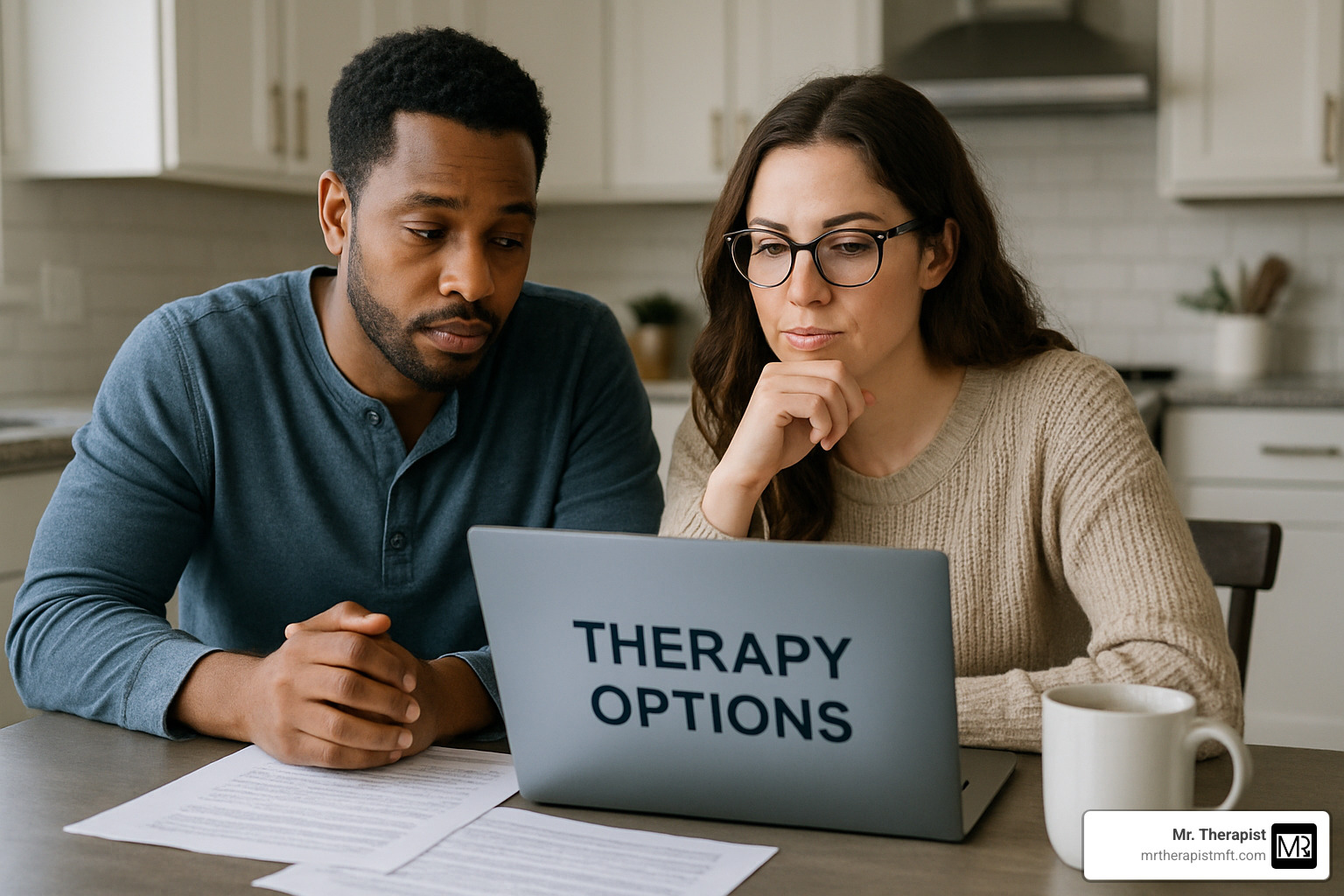
7. Online Therapy Options
The digital revolution has made therapy more affordable through reduced overhead costs. Online platforms often use subscription models rather than per-session pricing, potentially saving you hundreds over several months. Plus, you’ll save on commuting costs and time, making it easier to fit therapy into busy schedules.
8. Pre-paid Packages
Think of this as the “Costco approach” to therapy – buying in bulk often saves money. Many therapists, including us at Mr. Therapist, offer 5-15% discounts when couples commit to multiple sessions upfront. Not only does this reduce your marriage counseling price, but it also encourages the consistent attendance that leads to better outcomes.
9. Employee Assistance Programs (EAPs)
That benefits packet from your HR department might contain a hidden gem – free counseling sessions through your EAP. Many employers offer 3-8 completely free therapy sessions as part of your benefits package. These programs are confidential (your employer won’t know you’re using the service) and can be an excellent starting point for addressing relationship concerns.
Marriage counseling price hacks most couples overlook
Beyond these standard approaches, a few clever strategies can make therapy more affordable:
Your FSA or HSA can be a secret weapon against high therapy costs. Using these pre-tax funds for marriage counseling essentially gives you a discount equal to your tax rate – potentially saving 20-30% on your sessions.
If you’re comfortable with online therapy, consider looking across state lines where therapists might charge less due to different cost-of-living factors. This geographic arbitrage can lead to significant savings.
Another overlooked approach is adjusting session frequency rather than abandoning therapy altogether. Bi-weekly sessions with meaningful homework in between can be more effective than stopping therapy due to cost concerns. Some couples even find that shorter weekly sessions (30 minutes) help them maintain momentum while fitting their budget better than full-length bi-weekly appointments.
Don’t forget to ask about pro bono opportunities. Many therapists, including our team at Mr. Therapist, reserve a slot or two for clients experiencing severe financial hardship. While these spots are limited, they reflect our profession’s commitment to helping those in need.
Investing in your relationship now through affordable therapy options can save you from the much higher emotional and financial costs of relationship breakdown down the road. As we like to say at Mr. Therapist, “Finding affordable help isn’t just being thrifty – it’s being smart about what matters most.”
For more detailed information about making therapy affordable, check out our guide to Affordable Couples Therapy.
Is Marriage Counseling Worth the Investment?
When looking at the marriage counseling price tag, it’s natural to wonder if the benefits truly justify the cost. The good news? Research consistently shows that couples therapy works for about 70-75% of couples who give it a try, making it one of the most successful forms of psychological intervention available today.
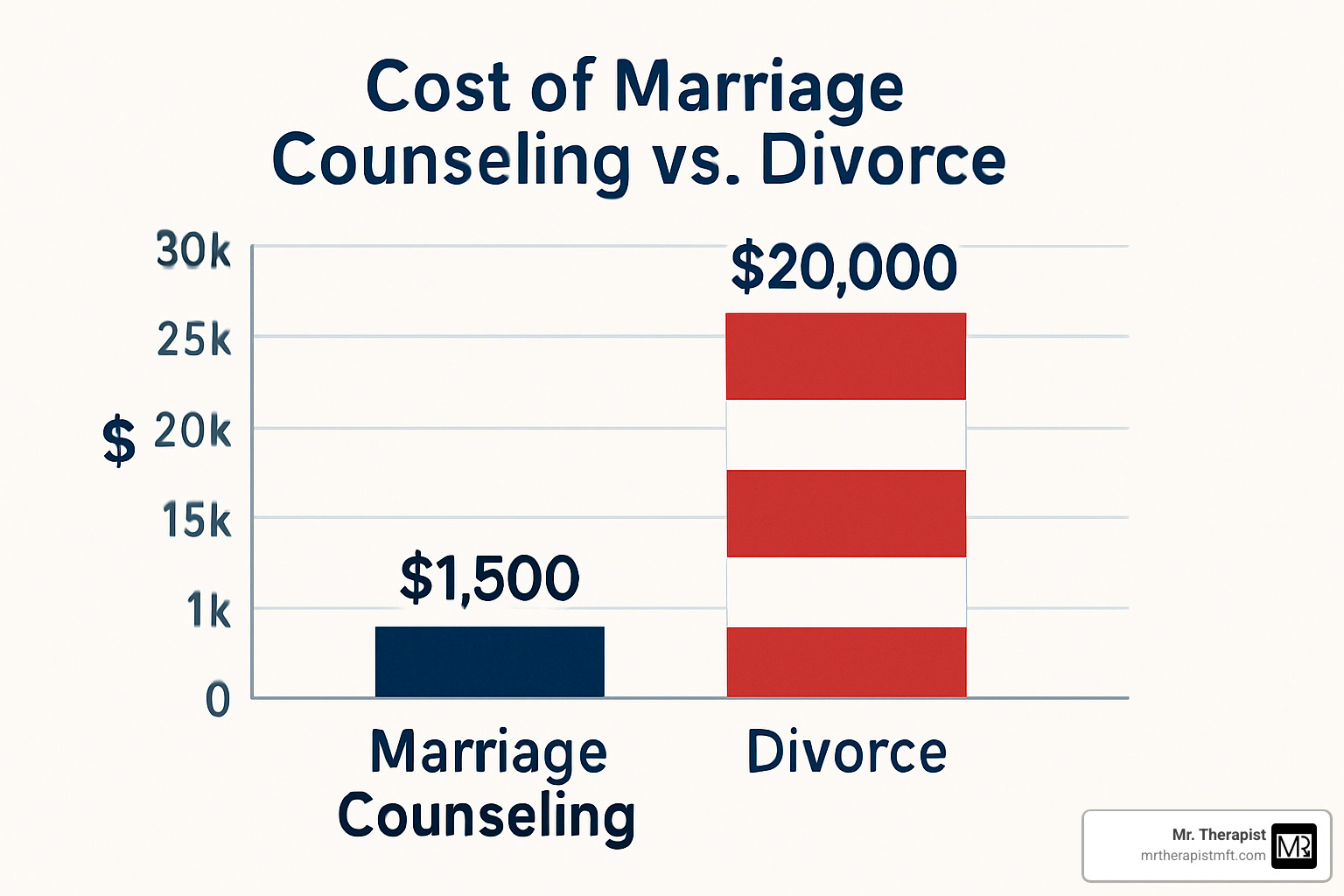
Quantifiable Benefits
Think of marriage counseling as preventative medicine for your relationship. The average divorce costs between $15,000-$20,000 in legal fees alone—and that’s before you consider splitting assets, maintaining separate households, and potential child support or alimony payments. Suddenly, that $150 session fee doesn’t seem so steep, does it?
Beyond avoiding divorce costs, relationship therapy offers other financial advantages. When relationship distress spills over into your work life (and it almost always does), your career suffers. Employees struggling with marital problems miss more workdays and report significantly lower productivity, potentially costing thousands in lost income or advancement opportunities.
Your physical health benefits too. Chronic relationship stress is linked to numerous health problems, from cardiovascular issues to weakened immune function and mental health challenges. The healthcare savings from addressing relationship problems early can be substantial over time.
If you have children, the benefits multiply. Kids whose parents maintain healthy relationships typically show better academic performance, fewer behavioral issues, and stronger mental health—potentially saving thousands in intervention services while giving your children an invaluable gift.
Intangible Returns
Some of the most valuable returns on your therapy investment can’t be measured in dollars and cents. The skills couples learn in effective therapy create ripple effects throughout their lives:
Improved communication skills become assets in every relationship you have—not just with your partner, but with friends, colleagues, and family members.
Deeper emotional connection creates a sense of security and belonging that fundamentally changes how you move through the world. As one of our clients at Mr. Therapist recently shared: “For the first time in years, I feel truly seen by my partner.”
Better conflict resolution means disagreements no longer escalate into full-blown battles. Couples learn to steer differences without damaging their connection—a skill that brings peace to the entire household.
When parents develop a stronger parenting partnership, children thrive in the consistency and security that provides. And perhaps most importantly, therapy often leads to greater life satisfaction and happiness for both partners.
As one client eloquently put it: “The $2,000 we spent on marriage counseling saved us from a divorce that would have cost us our house, our savings, and our children’s sense of security. It was the best investment we’ve ever made.”
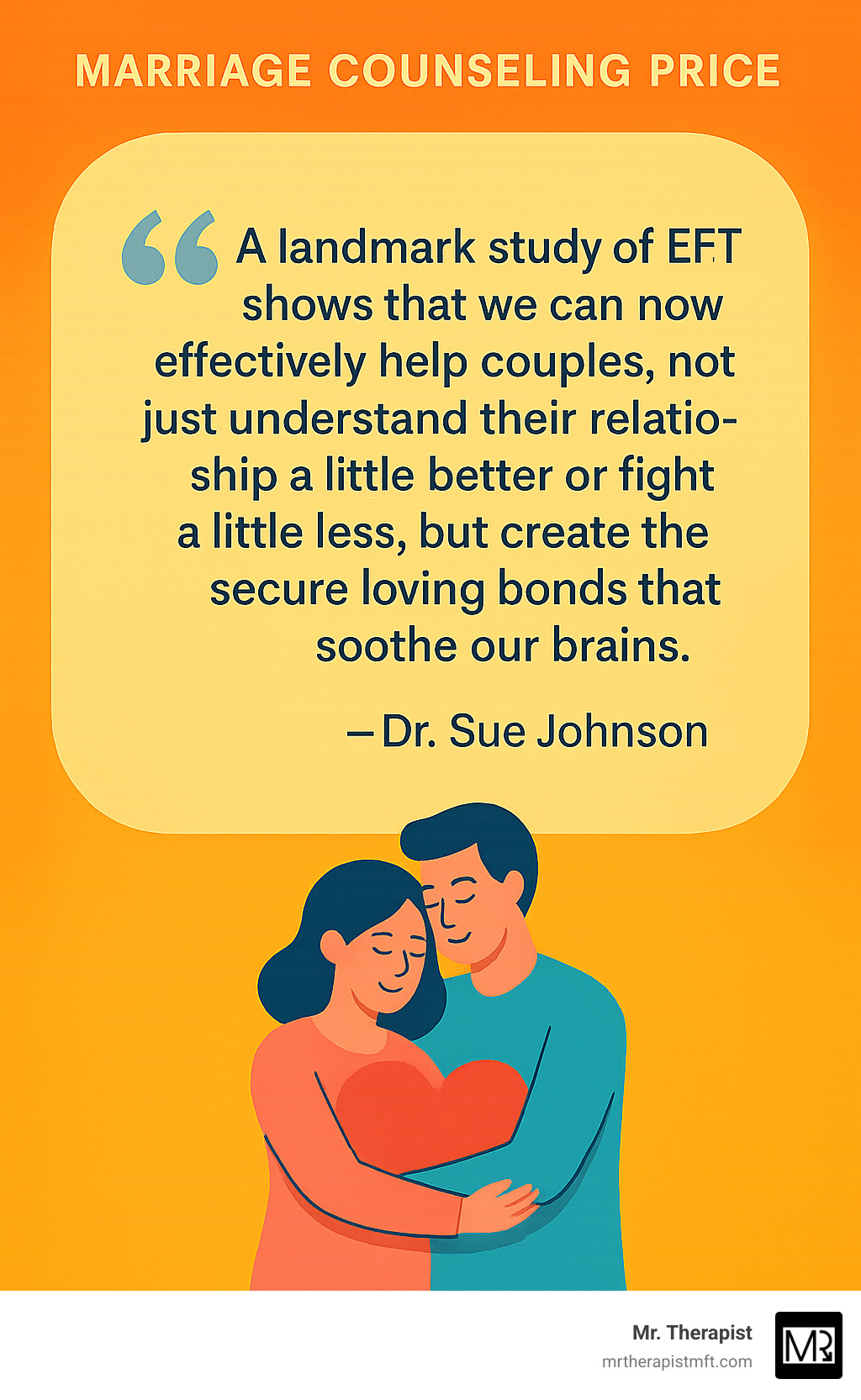
Hidden costs of NOT addressing problems
When couples delay seeking help because of concerns about the marriage counseling price, they often end up paying much more in hidden costs down the road.
The financial toll of relationship breakdown starts long before divorce papers are filed. Even preliminary legal consultations can cost $300-$500 per hour, while mediation services average $3,000-$8,000. If you separate, you’re suddenly looking at doubled housing expenses and the eventual division of assets where each partner typically retains only 50% of what you built together. Even your tax situation worsens without those married filing status benefits.
Your health takes a hit too. Research shows people experiencing relationship distress use 21.5% more healthcare services. Work productivity can drop by 5-25% during relationship crises, directly impacting your earning potential. Children often need therapy, academic support, or behavioral interventions when family stability crumbles. And your own mental health may require individual therapy and medication to manage the fallout.
Case Study: The Johnson Family
Consider the Johnsons, a couple who initially hesitated at spending $150 per weekly session for marriage counseling—a total investment of about $3,000 for 20 sessions over 5 months. Instead, they separated six months later, which resulted in:
$6,500 in attorney fees, $2,400 in additional housing costs during separation, $1,800 in individual therapy for depression, $3,200 in child therapy and academic support, plus incalculable emotional distress for everyone involved.
Their total financial cost? $13,900—more than four times what therapy would have cost.
When they eventually reconciled after a year apart, they still needed marriage counseling to rebuild trust and communication—now with additional trauma to process.
As Dr. Elyssa Helfer acknowledges, “One of the major drawbacks of marriage counseling is that it can be incredibly challenging. Committing to digging deep into the emotional injuries in a relationship can be painful…” However, this temporary discomfort pales in comparison to the devastating pain and cost of relationship dissolution.
At Mr. Therapist, we’ve witnessed countless couples transform their relationships through the power of Emotion-Focused Therapy. While the marriage counseling price may feel significant in the moment, most couples find it’s one of the wisest investments they’ve ever made—in their relationship, their family’s wellbeing, and their own personal happiness.
Conclusion & Next Steps
The marriage counseling price you pay today is an investment in your relationship’s future. While the national average of $100 per session may seem significant, when viewed in the context of potential alternatives—like the emotional and financial toll of divorce—therapy emerges as a cost-effective option for couples committed to improving their relationship.
At Mr. Therapist, we specialize in Emotion-Focused Therapy (EFT), an evidence-based approach that helps couples identify negative interaction patterns and develop secure emotional bonds. Our practice in San Clemente, California is committed to making quality relationship therapy accessible through transparent pricing, sliding-scale options, and both in-person and telehealth services.
Remember these key takeaways about marriage counseling costs:
- National averages ($75-$250) provide a baseline, but local factors significantly influence pricing
- Online options ($65-$100/week) offer more affordable alternatives without sacrificing quality
- Insurance coverage is limited but may be available in specific circumstances
- Sliding-scale fees are offered by 68% of marriage therapists
- The investment pays dividends in both relationship quality and potential financial savings
If you’re ready to invest in your relationship, we encourage you to:
- Schedule a consultation to discuss your specific needs and budget constraints
- Explore payment options, including packages, sliding-scale fees, and FSA/HSA usage
- Consider format flexibility, including telehealth sessions that may reduce costs
- Remember the big picture—the cost of therapy is typically a fraction of the cost of relationship dissolution
As we often tell our clients at Mr. Therapist: “While love conquers all, patience, accountability, and positivity can make a relationship thrive.” Adding professional guidance through marriage counseling can provide the tools and insights to make that thriving relationship a reality—an investment that pays emotional dividends for years to come.
Ready to take the next step? Contact us to learn more about our approach to couples therapy and how we can work within your budget to strengthen your relationship.



